牛津七年级上英语知识点汇总
牛津英语七年级上册期末复习知识点整理
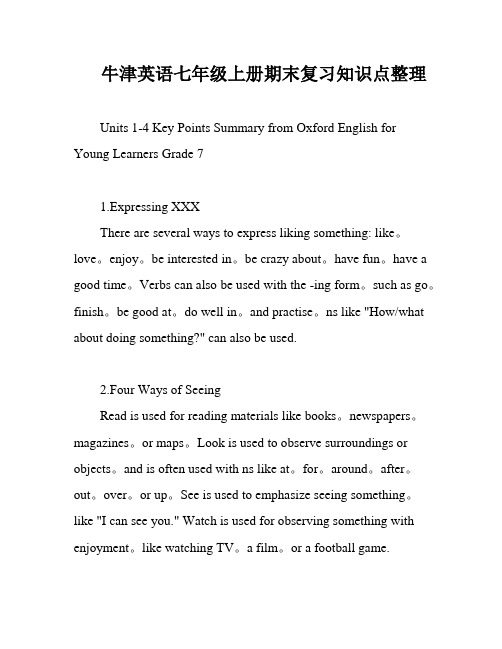
牛津英语七年级上册期末复习知识点整理Units 1-4 Key Points Summary from Oxford English for Young Learners Grade 71.Expressing XXXThere are several ways to express liking something: like。
love。
enjoy。
be interested in。
be crazy about。
have fun。
have a good time。
Verbs can also be used with the -ing form。
such as go。
finish。
be good at。
do well in。
and practise。
ns like "How/what about doing something?" can also be used.2.Four Ways of SeeingRead is used for reading materials like books。
newspapers。
magazines。
or maps。
Look is used to observe surroundings or objects。
and is often used with ns like at。
for。
around。
after。
out。
over。
or up。
See is used to emphasize seeing something。
like "I can see you." Watch is used for observing something with enjoyment。
like watching TV。
a film。
or a football game.3.XXX Ways of DressingPut on emphasizes the n of putting on something。
牛津英语七年级上册期末复习知识点整理

牛津英语七年级上册期末复习知识点整理译林版牛津英语七年级上册期末复知识点整理Units1--4重点知识点总结n.名词v.动词vt.及物动词vi.不及物动词adj.形容词adv.副词prep.介词pron.代词conj.连词1、喜欢like / love / enjoy / be XXX (痴迷于)/ have fun / have a good time +doing sth.动词+doing的还有Go XXX good at doing sth./ do well in doing sth.XXX.2、“四大看”read vt.看读物(XXX等)look vi.瞧常用短语look at/ for/around/after/out/over/upsee vt.瞥见,夸大成效I can see you.watch vt.带有观赏性的寓目watch TV/ a film / a football game3、“五大穿着”Put on强调“穿上”的动作XXX ____XXX.Wear强调“穿着”的状态;进行时态表示暂时的情况XXX glassesDress(1)dress sb.(2) dress oneself(3) dress up as(4) get dressedIn(穿戴)后接颜色(或衣服),表示状态look!XXX is_____a XXX后接人指衣服穿在某人身上看出区别来。
The red coat looks nice on you.4、“四大花费”XXX:sb.(人)+ XXX.sb.(人)+ spend +工夫/款项+(in) XXX.pay:sb.(人)+pay +款项+for sth.cost:sth.(物)+ cost + sb.+金钱XXX时间XXX:it XXX sb. +时间+ to do sth.5、“三大地点副词”Home / there /here前不加任何的介词welcome home / come here / go there6、“三大使役动词”Make sb. do sth./ have sb. do sth. / let sb.do sth.7、晤面打号召用语(1)Nice to meet you . (2) Glad to meet you . (3) How are you ? (4) How are you doing ?(5)How is it going ?(6)How is everything going?(7) What’s up?8、基数词+year(s)+old透露表现“…岁”发问用“how old”名词性短语数词-year-old也透露表现年岁,但其为描述词性短语“前有冠词后著名(词)”Eg. Helen is 11 years old = Helen is an 11-year-old girl.9、Let’s与let us的区分Let’s do sth.指包括听者(对方)和说者(我们)都在内,表示建议Let us do XXX.指“让(允许)我们做某事”而听者(对方)不做,只有“我们”做10、play+the+乐器类名词e.g. Play the pianoPlay +球类活动play+ football / play cards / play chess11、She comes from Shanghai= She is from Shanghai .注:如何提问Shanghai及如何改一般疑问句12、be good at =do well in = be clever at = study sth. wellBe good at (反) be bad atdo well in (反) be poor in13、介词over的用法(1)”在…正上方” There is a bridge over the river.(2)”超出”A plane flies over the house(3)”跨越” There are over 20 boys in this class.(4)”竣事” Class is over! / Game is over.14、every one与everyone辨析区分(1)Every one能够与of连用,而everyone却不克不及与of连用Eg.every one of the children XXX.(2) XXX只指人=everybody而every one既指人又可指物配合点:谓语动词都要用“三单”15、family的用法:“家庭”作为团体谓语动词用“单数”He has a big family.“家人”夸大成员,是复数寄义,谓语动词用“真相” My family are at home.拓展:个人名词有people、class、police、sheep、deer、furniture等16、all/ both/ each/every/neither/ either的用法all(1)三者或三者以上“全部、都”(2)all + the +名词(all the afternoon = the whole afternoon)(3)all放在行为动词前,名词前;be动词后(4) all of +宾格/名词复数Both(1)二者都(2)后可跟of +宾格/名词复数Both sides of XXX指两个或两个以上“每个”个别Each side of the XXX.Every指良多人或事物的“部分”后接名词单数Every student is here .一切人都在。
七年级英语上册知识点牛津

七年级英语上册知识点牛津作为初中英语的开端,七年级英语上册的知识点牛津十分重要。
在这里,我们将对牛津七年级英语上册中的重要知识点进行梳理和整理,帮助同学们更好地学习和提高英语水平。
一、基本语法1. 一般现在时:表示现在正在进行或习惯性的动作。
例如:I usually get up at six in the morning.(我通常早上六点起床。
)2. 现在进行时:表示现在正在进行的动作。
例如:She is reading a book.(她正在看书。
)3. 一般过去时:表示已经完成的动作。
例如:I watched a movie yesterday.(我昨天看了一部电影。
)4. 现在完成时:表示已经完成的动作对现在造成的影响。
例如:I have finished my homework.(我已经完成了我的作业。
)5. 现在完成进行时:表示从过去某时开始一直到现在正在进行的动作。
例如:I have been studying English for two hours.(我已经学了两个小时的英语。
)二、基本词汇1. 数字:one, two, three, four, five, six, seven, eight, nine, ten2. 人称代词和物主代词:I, you, he, she, it, we, they, me, you, him, her, it, us, them3. 颜色:red, blue, green, yellow, black, white4. 学科:math, science, history, geography, music, art, PE三、基本句型1. 陈述句:主语 + 谓语 + 宾语例如:I love English.(我爱英语。
)2. 疑问句:疑问词 + 动词 + 主语 + 其他信息例如:What is your name?(你叫什么名字?)3. 否定句:主语 + 动词 + not + 宾语例如:I do not like math.(我不喜欢数学。
电子版 _ 牛津版初中英语七年级_初一上册知识重点归纳
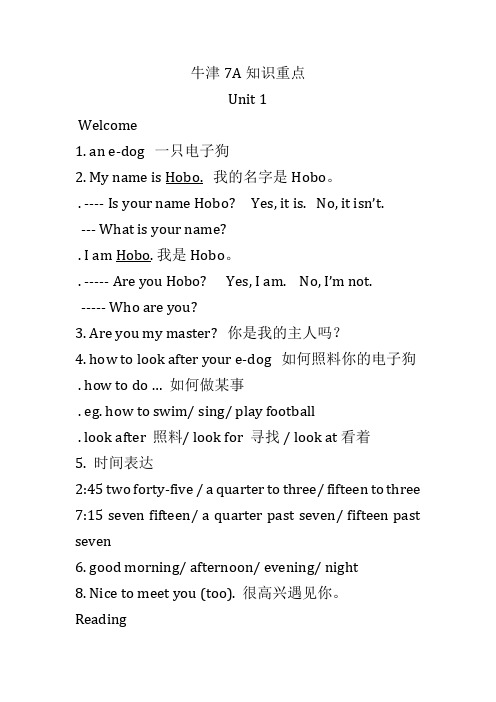
牛津7A知识重点Unit 1Welcome1. an e-dog 一只电子狗2. My name is Hobo. 我的名字是Hobo。
. ---- Is your name Hobo? Yes, it is. No, it isn’t.--- What is your name?. I am Hobo. 我是Hobo。
. ----- Are you Hobo? Yes, I am. No, I’m not.----- Who are you?3. Are you my master? 你是我的主人吗?4. how to look after your e-dog 如何照料你的电子狗 . how to do …如何做某事. eg. how to swim/ sing/ play football. look after 照料/ look for 寻找 / look at 看着5. 时间表达2:45 two forty-five / a quarter to three/ fifteen to three7:15 seven fifteen/ a quarter past seven/ fifteen past seven6. good morning/ afternoon/ evening/ night8. Nice to meet you (too). 很高兴遇见你。
Reading1. welcome to Class 1, Grade 7. welcome to + 地点欢迎来到某地. eg. welcome to my home 欢迎来到我家. welcome home 欢迎回家. Class 1, Grade 7 = Class One, Grade Seven. 注意:英语中的时间、地点等遵循从小到大的原则 . on 18th September, 2015. 59 Meilan Road, Taizhou, Jiangsu2. I am 12 years old. = I am 12.. I am a 12-year-old boy/ girl.. an 11-year-old girl 一个11岁的女孩. 类似:an + 11, 8, 18, 80-89 ……3. I have short hair. = My hair is short.4. love/ like/ enjoy doing …. love / like to do …5. Let’s meet my new classmates.. let sb. do …. eg. let’s be friends. let me help you6. I like sports.. a sports meeting7. I often play football after school.. play football / play chess. play the piano/ violin. after school/ class8. tall and slim9. like music. like listening to music/ like to listen to music10. He is from Nanjing. = He comes from Nanjing.. be from …= come from …11. He is good at Maths. = He does well in Maths. = He studies Maths well.. be good at … = do well in …= do…well. be good at …/ be good at doing…. do well in …/ do well in doing…12. Sandy doesn’t have long hair.13. a new student at Sunshine Middle SchoolGrammar1. in Grade 72. over there3. our English teacher4. 句式变化. The teachers are in the classroom.---- The teachers aren’t in the classroom.Are the teachers in the classroom? Yes, they are. No, they aren’t.Where are the teachers?注意几种情况:1. There are some apples on the tree. 疑问句、否定句:some ----any---- There aren’t any apples on the tree.Are there any apples on the tree? Yes, there are. No, there aren’t.2. Sandy is tall and slim. 否定句:and ---or--- Sandy isn’t tall or slim.Is Sandy tall and slim? Yes, she is. No, she isn’t.3. Your sister is in my house. 人称变化:1---2,2---1----- Is my sister in your house?Your new teacher is Mr. Wu.---- Is my new teacher Mr. Wu?Integrated skills1. love dancing. be good at swimming. dance ---- dancing, swim --- swimming .双写:run, sit, put, jog, shop, plan, begin 2. hobby --- hobbies注意:辅以字母+y结尾,变y为i加es 注:boys, toys, monkeys3. This is …, this is…介绍陌生人4.I see. = I know.. Let me see. = Let me think.5. Glad to see you. = I am glad to see you. . Nice to meet you.Study skills1. 5 个音标2. listen to the music3. fly kites4. like playing games5. the cute baby6. go home lateTask1. live with sb. live with my family. live in … live in Beijing. live on … live on the first floor2. wear glasses/ hats/ shoes3. all the lessons. all 用于三者及以上4. I have some new friends at school.. at school5. They are all very nice. = All of them are very nice. 注意:all的位置,be动词之前,实意动词之后。
牛津译林版七年级上册英语Unit 1-Unit 4知识点总结

牛津译林版七年级上册英语Unit 1-Unit 4知识点总结Unit 1知识点总结一、单词短语1.love比like程度更深love doing/to do sth. loving doing多表示一贯的爱好,而love to do则多表示具体喜欢做的一件事。
enjoy doing sth (enjoy 译为喜欢,只能加doing)2.What's your name ? 回答:My name is .../ I’m....询问名字的方法还有:May I have your name ?/ Can you tell me your name ?3.master主人one’s master = the master of sb 某物或某人的主人Master(硕士)4.5.How to look after your e-dog.如何照顾你的电子狗。
疑问词+ 不定式(to do)如:I don’t know what to eat.look after=take care of照顾;照料I can look after myself.我能照顾我自己。
look after sb well = take good care of sb 照顾好某人look for 寻找look at 看。
look like 看起来像look out 小心(=Be careful! / Take care)look out of 朝...往外看look the same 看起来一样6.The new students in Class 1, Grade 7 at Sunshine Middle School are greeting each other.Class One Grade Seven 由小到大,都要大写用法相同的还有number ,lesson,unit,group,roomI’m in Grade 7.(对划线部分提问)What/ Which grade are you in?Our school has six grades.我们学校有6个年级。
牛津上海版七年级英语上册Unit8知识点汇总

牛津上海版七年级英语上册Unit8知识点汇总Unit8 Growing healthy, growing strongI 词组:1.diet and health 饮食和健康2. grow healthy 长得健康3. grow strong 长得健壮4. spend one’s weekend 过周末5.at Health Camp 在健康度假营6.go swimming 去游泳7.in the swimming pool 在游泳池里8.Neither do I. 我也不9.So do I. 我也是10.play badminton 打羽毛球11.read magazines 读杂志12.in the reading room 在阅览室13.in the hall 在大厅里14.a cartoon called…. 一部名为……的卡通片15.exciting and interesting 既激动又有趣16.That's a good idea. 那真是个好主意17.an outing 一次远足18.an information sheet 一张信息纸19.in the camp 在度假营里20.stay healthy and strong 保持健康和强壮21.to be a healthy child 做一个健康的孩子22.go to bed early 早睡23.get up early 早起24.exercise regularly 定期锻炼25.at least 至少26.eight glasses of water 八杯水27.too much sweet food 太多的甜食28.too many soft drinks 太多的软饮料29.good/ bad habits 好/坏习惯30.have a sore throat 喉咙痛31.have toothache 牙痛32.have a stomach ache 胃痛st Sunday 上周日34.three packets of crisps 三包薯片35.two boxes of ice cream 两盒冰淇凌36.some vegetables 一些蔬菜37.four bars of chocolate 四块巧克力38.three bottles of lemonade 三杯柠檬汁39.a lot of fried food 许多油炸食品40.enough fruit 足够的水果41.watch less TV 少看电视42.eat fewer crisps 少吃薯片43.eat more fruit 多吃水果44.change my bad habits 改变我的坏习惯ed to do sth. 过去常常做某事46.not… any longer. 不再47.do a lot of exercise regularly 有规律地做许多的运动48.study hard 努力学习49.in the past 在过去II. 词性转换:1. health n. 健康healthy a. 健康的unhealthy a. 不健康的2. call v. 叫喊;呼唤;打电话called a. 被叫做……的,名为……的3. regularly adv. 有规律地;正常地regular adj. 有规律的;正常的irregularly adv. 无规律地;不正常地irregular adj. 无规律的;不正常的4. many/much adj./ pron. 许多的/许多more adj./ pron. 更多的/更多5. few adj. 少数的;几乎没有的fewer adj. 较少的pron. 少数;几乎没有pron. 较少6. little adj. 少的less adj.较少的adv.少adv.较少地n. 没有多少n. 更少的数7. change v. 变化,交换change n. 变化;零钱changeable adj. 易变的,不定的8. suggestion n. 建议suggest v. 建议9 exciting adj.令人激动的excited 感到激动的10 interesting interestedInteresting places= places of interest be interested inIII. 语言点/句型:1.Mr Hu and the students are spending their weekend at Health Camp. 胡老师和学生在健康营度周末。
英语七年级上册牛津版Unit 1 单元知识要点
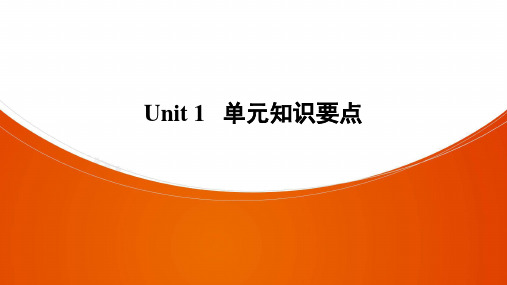
返回目录
Unit 1
单元知识要点
三、不定冠词 a,an 的用法 a 用在以辅音音素开头的词前面,例如:
a man(一个男人);a university(一所大学);a hat(一顶帽子); a European(一个欧洲人)
country n.国家 countryside n.乡村
dream = a series of mental images occurring during sleep n. 梦 dreamer n. 梦想家,不切实际的人
返回目录
Unit 1
单元知识要点
US = United States n. 美国 engineer = a person who use scientific knowledge to solve practical problems n. 工程师 engine n. 引擎 mountain = hill n.山 world = universe = earth n.世界 flat =apartment n.公寓
返回目录
Unit 1
单元知识要点
you→(反身代词)yourself/yourselves country→(复数)countries dream→(动词过去式)dreamed engine→(指人的名词)engineer old→(比较级)elder/ older
返回目录
Unit 1
单元知识要点
返回目录
Unit 1
单元知识要点
特殊疑问词 意思
what
什么
who when
where
谁 什么时候
哪里
用法
用于询问职业或事物是什么
用于询问人的身份 用于询问时间 用于询问地点
2024秋沪教牛津新七年级上知识点清单(背诵版)
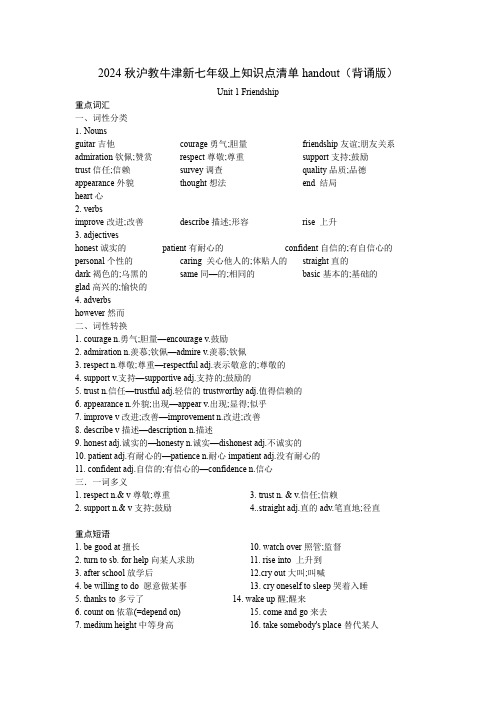
2024秋沪教牛津新七年级上知识点清单handout(背诵版)Unit 1 Friendship重点词汇一、词性分类1.Nounsguitar吉他courage勇气;胆量friendship友谊;朋友关系admiration钦佩;赞赏respect尊敬;尊重support支持;鼓励trust信任;信赖survey调查quality品质;品德appearance外貌thought想法end 结局heart心2. verbsimprove改进;改善describe描述;形容rise 上升3. adjectiveshonest诚实的patient有耐心的confident自信的;有自信心的personal个性的caring 关心他人的;体贴人的straight直的dark褐色的;乌黑的same同—的;相同的basic基本的;基础的glad高兴的;愉快的4. adverbshowever然而二、词性转换1. courage n.勇气;胆量—encourage v.鼓励2. admiration n.羡慕;钦佩—admire v.羡慕;钦佩3. respect n.尊敬;尊重—respectful adj.表示敬意的;尊敬的4. support v.支持—supportive adj.支持的;鼓励的5. trust n.信任—trustful adj.轻信的trustworthy adj.值得信赖的6. appearance n.外貌;出现—appear v.出现;显得;似乎7. improve v改进;改善—improvement n.改进;改善8. describe v描述—description n.描述9. honest adj.诚实的—honesty n.诚实—dishonest adj.不诚实的10. patient adj.有耐心的—patience n.耐心impatient adj.没有耐心的11. confident adj.自信的;有信心的—confidence n.信心三.一词多义1. respect n.& v尊敬;尊重 3. trust n. & v.信任;信赖2. support n.& v支持;鼓励 4..straight adj.直的adv.笔直地;径直重点短语1. be good at擅长10. watch over照管;监督2. turn to sb. for help向某人求助11. rise into 上升到3. after school放学后12.cry out大叫;叫喊4. be willing to do 愿意做某事13. cry oneself to sleep哭着入睡5. thanks to多亏了14. wake up醒;醒来6. count on依靠(=depend on)15. come and go来去7. medium height中等身高16. take somebody's place替代某人8. modern dance现代舞17. come along 出现9. take care of照顾(= look after / care for)核心句式1. What do you like doing?你喜欢做什么?2.Li Hua is helpful and patient.李华乐于助人且有耐心。
七年级上册,牛津版知识点整理,7AU6知识点梳理
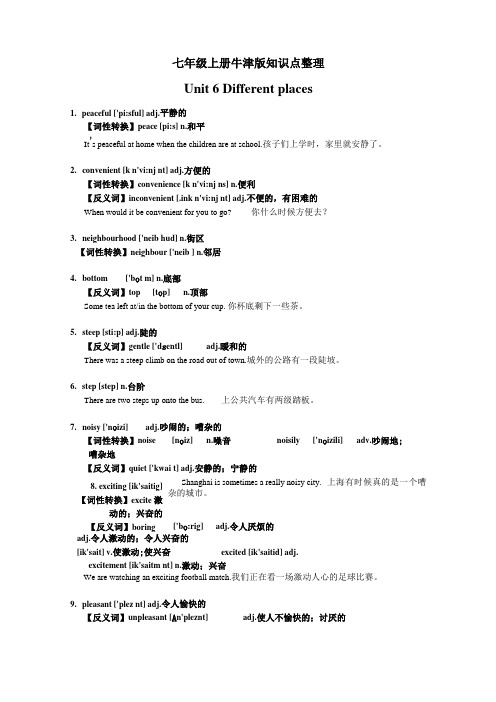
七年级上册牛津版知识点整理Unit 6 Different places1. peaceful ['pi:sful] adj.平静的【词性转换】peace [pi:s] n.和平It ’s peaceful at home when the children are at school.孩子们上学时,家里就安静了。
2. convenient [k n'vi:nj nt] adj.方便的【词性转换】convenience [k n'vi:nj ns] n.便利【反义词】inconvenient [.ink n'vi:nj nt] adj.不便的,有困难的When would it be convenient for you to go? 你什么时候方便去?3. neighbourhood ['neib hud] n.街区【词性转换】neighbour ['neib ] n.邻居4. bottom['b o t m] n.底部【反义词】top[t o p]n.顶部Some tea left at/in the bottom of your cup. 你杯底剩下一些茶。
5. steep [sti:p] adj.陡的【反义词】gentle ['d s entl] adj.暖和的There was a steep climb on the road out of town.城外的公路有一段陡坡。
6. step [step] n.台阶There are two steps up onto the bus. 上公共汽车有两级踏板。
7. noisy ['n o izi]adj.吵闹的;嘈杂的【词性转换】noise [n o iz]n.噪音noisily['n o izili]adv.吵闹地;嘈杂地【反义词】quiet ['kwai t] adj.安静的;宁静的Shanghai is sometimes a really noisy city. 上海有时候真的是一个嘈杂的城市。
七年级上英语知识点牛津
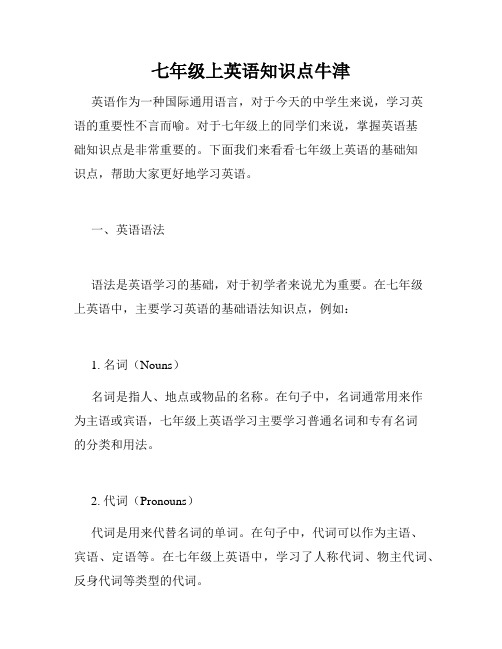
七年级上英语知识点牛津英语作为一种国际通用语言,对于今天的中学生来说,学习英语的重要性不言而喻。
对于七年级上的同学们来说,掌握英语基础知识点是非常重要的。
下面我们来看看七年级上英语的基础知识点,帮助大家更好地学习英语。
一、英语语法语法是英语学习的基础,对于初学者来说尤为重要。
在七年级上英语中,主要学习英语的基础语法知识点,例如:1. 名词(Nouns)名词是指人、地点或物品的名称。
在句子中,名词通常用来作为主语或宾语,七年级上英语学习主要学习普通名词和专有名词的分类和用法。
2. 代词(Pronouns)代词是用来代替名词的单词。
在句子中,代词可以作为主语、宾语、定语等。
在七年级上英语中,学习了人称代词、物主代词、反身代词等类型的代词。
3. 动词(Verbs)动词是表示动作或状态的词语。
在句子中,动词可以作为谓语、主语、宾语等。
七年级学习的英语动词主要指动词的时态和语态。
4. 形容词和副词(Adjectives & Adverbs)形容词和副词分别用来修饰名词和动词。
形容词描述名词的性质(如大小、颜色、形状等),而副词描述动词、形容词和其他副词的方式(如快慢、高低、亮度等)。
二、英语词汇掌握英语常用单词和词组是学好英语的基础。
在七年级上英语中,主要学习英语常用单词、常用短语、常用句型等方面的知识。
1. 常用单词七年级上英语中,要求学生掌握2000多个常用单词。
一般来说,常用单词主要包括数字、时间、公共场所、家庭、食品、服装、颜色、自然界、身体部位、动物、运动等方面的词汇。
2. 常用短语常用短语是指由两个或多个单词组成、具有固定意义的短语。
在七年级上英语中,常用短语较为普遍,如问候语、购物用语、聚会用语、电话用语、旅游用语等。
3. 常用句型常用句型是指由常用单词和短语组成的固定句子,是日常英语交流中常用的表达方式。
在七年级上英语中,要求学生掌握一些基本的常用句型,例如谈论天气、打电话、介绍自己和别人、询问时间等。
牛津译林版七年级英语上册全册知识点汇总(Unit1-8)

牛津译林版七年级英语上册全册知识点汇总(Unit1-8)Unit 1 This is me!知识点归纳汇总Words & Phrases:(结合音标记忆)master/'mɑːstə/、bicycle/'baɪsɪkl/、Excuse/ɪkˈskju:s; ɪkˈskju:z/、hobby/'hɒbɪ/、welcome/ˈwelkəm/、swimming/'swɪmɪŋ/、music/'mjuːzɪk/、polite/pə'laɪt/、chinese/tʃaɪˈniːz/、badminton /'bædmɪnt(ə)n/、cousin/'kʌz(ə)n/enjoy doing、work hard、be good at doing、like to do/doing、look up/after/like/out、help sb do sth、want to do sth、come from、be from、love doing、take sb for a walk、be born in sp、fly a kite with sb、walk to sp = go to sp on foot.Common phonetic:(常见音标)other/'ʌðə/ boat/bəʊt/ phone/fəʊn/ old/əʊld/bread/bred/ great/greɪt/ heavy/'hevɪ/ head/hed/that /ðæt; ðət/ thing /θɪŋ/ these/ðiːz/ those/ðəʊz/dog/dɒg/ shop/ʃɒp/ short /ʃɔːt/ long /lɒŋ/Sentences:1、What is your father ? 提问职业。
(完整word版)牛津七年级上英语知识点总结
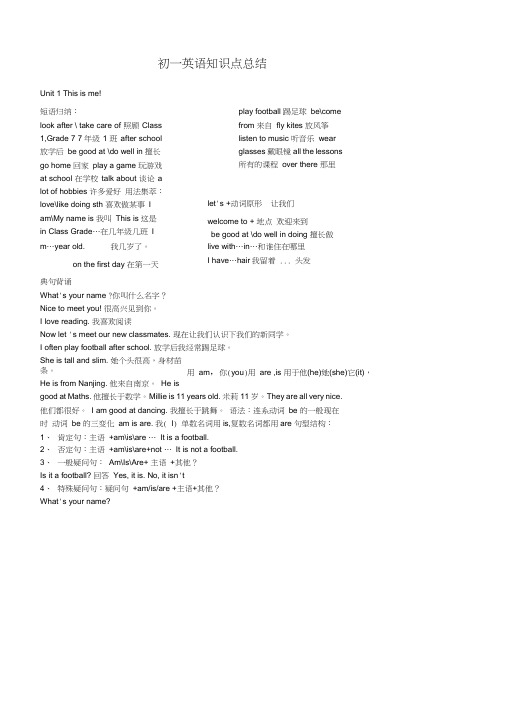
初一英语知识点总结Unit 1 This is me!短语归纳:look after \ take care of 照顾Class 1,Grade 7 7年级1 班after school 放学后be good at \do well in 擅长go home 回家play a game 玩游戏at school 在学校talk about 谈论a lot of hobbies 许多爱好用法集萃:love\like doing sth 喜欢做某事I am\My name is 我叫This is 这是in Class Grade…在几年级几班I m…year old. 我几岁了。
on the first day 在第一天play football 踢足球be\comefrom 来自fly kites 放风筝listen to music 听音乐wearglasses 戴眼镜all the lessons所有的课程over there 那里let's +动词原形让我们welcome to + 地点欢迎来到be good at \do well in doing 擅长做live with…in…和谁住在哪里I have…hair我留着 ... 头发典句背诵What's your name ?你叫什么名字?Nice to meet you! 很高兴见到你。
I love reading. 我喜欢阅读Now let 's meet our new classmates. 现在让我们认识下我们的新同学。
I often play football after school. 放学后我经常踢足球。
She is tall and slim. 她个头很高,身材苗条。
He is from Nanjing. 他来自南京。
He isgood at Maths. 他擅长于数学。
Millie is 11 years old. 米莉11 岁。
牛津七年级上英语知识点总结

一、基本语法知识:1.句子和句子成分:-句子由主语和谓语组成,主语通常是一个名词或代词,谓语是一个动词。
-一个句子可以包含其他成分,如宾语、定语、状语等。
2.名词:-名词可以指人、物、地方、动物等。
-名词有单数和复数形式,一般情况下,单数名词加-s来表示复数。
- 名词还有可数和不可数之分,可数名词可以用a或an来修饰,不可数名词通常不加冠词。
3.形容词:-形容词用来描述名词的特征或特性。
-形容词有比较级和最高级,比较级用于比较两个人或物的不同,最高级用于三个或三个以上的人或物的比较。
4.代词:- 代词用来代替名词,如主格代词(I、you、he/she/it等)、宾格代词(me、you、him/her/it等)、物主代词(my、your、his/her/its 等)等。
5.动词:-动词用来表示动作或状态。
-动词有时态的变化,如现在时(一般现在时、现在进行时)、过去时(一般过去时)等。
-动词有人称的变化,如第三人称单数动词在一般现在时加-s。
6.副词:-副词用来修饰动词、形容词或其他副词,表示时间、地点、方式等。
-副词有比较级和最高级。
7.介词:-介词用来表示时间、地点、方向、目的等关系。
- 常用的介词有at、in、on、by、about、for等。
8.冠词:-冠词用来限定名词的范围,分为定冠词和不定冠词。
- 定冠词是"the",不定冠词是"a"或"an"。
9.祈使句:-祈使句用来表示请求、建议、命令等,一般省略主语,动词用原形。
二、词汇:1.常用动词:- be(am、is、are)、have、do、go、get、like、want、see、make、eat、drink等。
2.与家庭有关的词汇:- family、mother、father、brother、sister、grandfather、grandmother、uncle、aunt等。
上海牛津版英语七年级上知识点
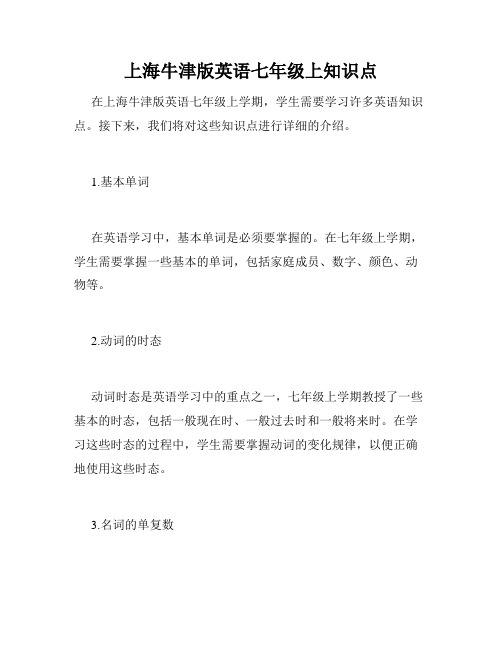
上海牛津版英语七年级上知识点在上海牛津版英语七年级上学期,学生需要学习许多英语知识点。
接下来,我们将对这些知识点进行详细的介绍。
1.基本单词在英语学习中,基本单词是必须要掌握的。
在七年级上学期,学生需要掌握一些基本的单词,包括家庭成员、数字、颜色、动物等。
2.动词的时态动词时态是英语学习中的重点之一,七年级上学期教授了一些基本的时态,包括一般现在时、一般过去时和一般将来时。
在学习这些时态的过程中,学生需要掌握动词的变化规律,以便正确地使用这些时态。
3.名词的单复数名词的单复数也是英语学习中必须要掌握的内容之一。
在七年级上学期,学生需要学习名词单数变复数的规则,并能正确地运用这些规则。
4.形容词与副词形容词和副词是描述词语,但是它们的用法不同。
在七年级上学期,学生需要学会正确地区分形容词和副词,并且学会正确地运用它们。
5.日常交际用语在英语学习中,交际用语非常重要,因为它们是日常交流中非常常用的词语。
在七年级上学期,学生需要学习一些常用的交际用语,例如问候、感谢、道别等等。
6.课堂表达在英语学习中,课堂表达具有非常重要的作用。
在七年级上学期,学生需要学会正确地表达自己的意思,包括用英语提问、回答问题,以及进行简单的口语交流。
7.听、说、读、写听、说、读、写是英语学习的四个方面,它们是相互关联的。
在七年级上学期,学生需要通过不同的练习,提高自己的听、说、读、写能力,并且能够巧妙地将这四个方面结合起来。
以上就是我们对于上海牛津版英语七年级上学期的知识点的详细介绍。
希望学生们在学习中能够认真对待这些知识点,使自己能够更好地掌握英语。
七年级上英语牛津版知识点
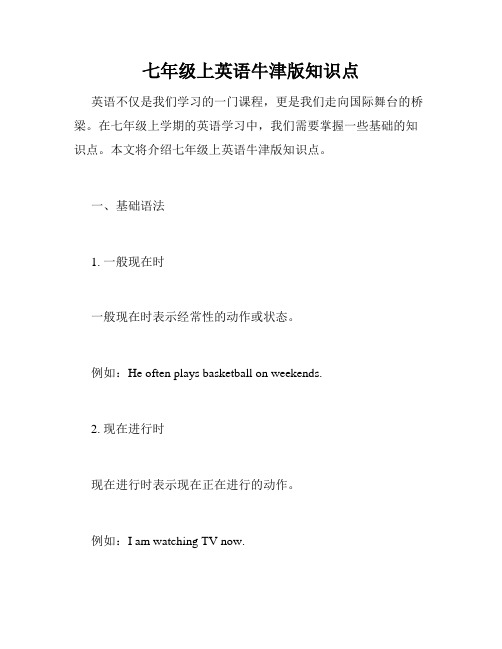
七年级上英语牛津版知识点英语不仅是我们学习的一门课程,更是我们走向国际舞台的桥梁。
在七年级上学期的英语学习中,我们需要掌握一些基础的知识点。
本文将介绍七年级上英语牛津版知识点。
一、基础语法1. 一般现在时一般现在时表示经常性的动作或状态。
例如:He often plays basketball on weekends.2. 现在进行时现在进行时表示现在正在进行的动作。
例如:I am watching TV now.3. 一般过去时一般过去时表示过去发生过的动作或状态。
例如:Yesterday, I went shopping with my friends.4. 动词的ing形式动词的ing形式可以用作动词的主语或者宾语等。
例如:Swimming is my favorite sport.5. 祈使句祈使句是一种命令、请求、嘱咐等具有要求性质的句子。
例如:Please give me a glass of water.6. 一般疑问句一般疑问句是一种表示疑问的句子,通常以动词或助动词开头。
例如:Do you like playing football?二、基础词汇1. 姓氏姓氏是指人的个人名称中的家族名称。
例如:My surname is Li.2. 数字数字是表示数量的词语,可以表示整数、小数等。
例如:There are ten apples on the table.3. 自我介绍自我介绍是介绍自己的一种方式,通常包括姓名、年龄、兴趣爱好等内容。
例如:My name is Jack. I am twelve years old. I like playing basketball.4. 学科名称学科名称是指人类在学术研究领域中划分的一种名称。
例如:Math is my favorite subject.5. 国家名称国家名称是指世界上各个国家的名称。
例如:China is a great country.6. 时间名称时间名称是指用于表示时间的一个词或短语。
七年级牛津英语上册知识点

七年级牛津英语上册知识点七年级牛津英语上册是英语学习的重要阶段。
在这个阶段中,学生需要掌握一些基础知识点,才能顺利地进行英语学习。
以下是七年级牛津英语上册的一些知识点。
一、基本语法知识点在英语语法中,有些基础知识点需要学生掌握。
这些知识点包括:1. 英语的基本语序:主语+谓语+宾语。
例如:I speak English.(我说英语。
)2. 永久性和非永久性的情态动词(can、could、shall、should等等)和助动词(be、do、have)例如:Can you speak Chinese?(你会说中文吗?)3. 一些常见的时态,包括现在时,过去时和将来时。
例如:He is reading a book.(他正在看书。
);She went to the zoo yesterday.(她昨天去了动物园。
);I will go to the park tomorrow.(我明天会去公园。
)二、基本词汇知识点在学习英语时,词汇掌握是很重要的。
以下是七年级牛津英语上册的一些基本词汇知识点:1. 时间、数字和日期例如:11 o'clock(11点);50(fifty);January 1st(1月1日)2. 家庭、动物和学习用具等词汇例如:father(父亲);cat(猫);pen(钢笔)3. 颜色和形状例如:red(红色);circle(圆形)三、基本句型在英语学习中,要掌握一些基本句型,以便于口语表达和书面表达。
以下是七年级牛津英语上册的一些基本句型:1. 接受和拒绝邀请即:Would you like to do something / go somewhere? Yes, I'd love to. / No, I can't.例如:Would you like to go shopping with me? Yes, I'd love to.(你愿意和我去逛街吗?好的,我很愿意。
牛津七年级英语上册知识点
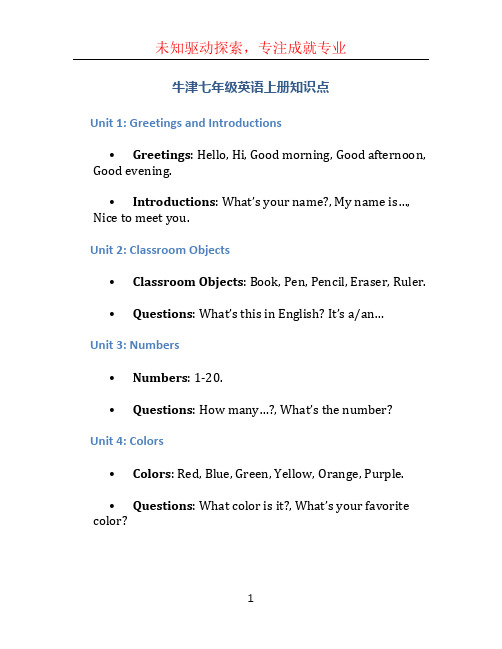
牛津七年级英语上册知识点Unit 1: Greetings and Introductions•Greetings: Hello, Hi, Good morning, Good afternoon, Good evening.•Introductions: What’s your name?, My name is…, Nice to meet you.Unit 2: Classroom Objects•Classroom Objects: Book, Pen, Pencil, Eraser, Ruler.•Questions: What’s this in English? It’s a/an…Unit 3: Numbers•Numbers: 1-20.•Questions: How many…?, What’s the number?Unit 4: Colors•Colors: Red, Blue, Green, Yellow, Orange, Purple.•Questions: What color is it?, What’s your favorite color?Unit 5: Daily Routines•Vocabulary: Get up, Have breakfast, Go to school, Have lunch, Go home, Do homework.•Questions: What time do you…?, When do you…? Unit 6: Family•Vocabulary: Father, Mother, Brother, Sister, Grandfather, Grandmother.•Questions: Who’s this? Who’s that? How many people are there in your family?Unit 7: Describing People•Vocabulary: Tall, Short, Long hair, Short hair, Glasses.•Questions: What’s she/he like? How does she/he look?Unit 8: Food and Drinks•Vocabulary: Rice, Noodles, Bread, Water, Juice, Milk.•Questions: What do you like to eat/drink?Unit 9: School Subjects•Vocabulary: English, Math, Science, Chinese, History, Geography, Music, Art, P.E.•Questions: What’s your favorite subject? What subjects do you study?Unit 10: Time•Vocabulary: W hat time is it?, It’s […].•Questions: What time do you usually…? What time is […]?Unit 11: Hobbies and Activities•Vocabulary: Play basketball, Swim, Dance, Draw, Sing, Listen to music.•Questions: What do you like to do in your free time? Do you like to…?Unit 12: In the Park•Vocabulary: Tree, Flower, Grass, Lake, Playground, Bench.•Questions: What can you see in the park? What do you like to do in the park?Unit 13: Weather•Vocabulary: Sunny, Cloudy, Rainy, Windy, Snowy.•Questions: What’s the weather like today? Do you like […]?。
牛津英语七年级上期各单元知识点归纳
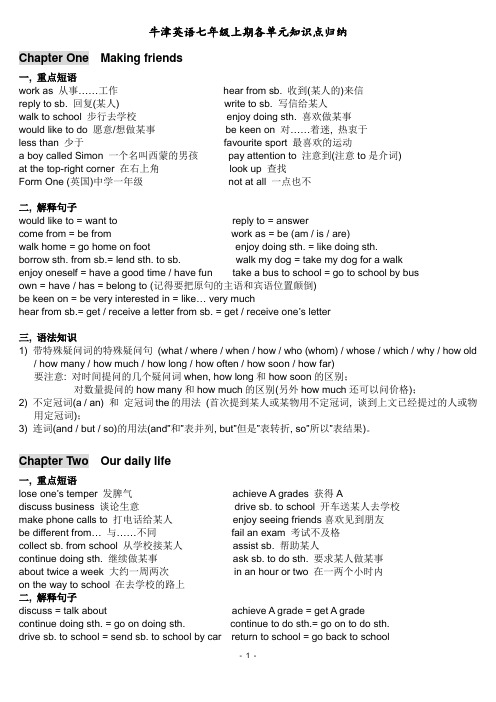
牛津英语七年级上期各单元知识点归纳Chapter One Making friends一, 重点短语work as 从事……工作hear from sb. 收到(某人的)来信reply to sb. 回复(某人) write to sb. 写信给某人walk to school 步行去学校enjoy doing sth. 喜欢做某事would like to do 愿意/想做某事be keen on 对……着迷, 热衷于less than 少于favourite sport 最喜欢的运动a boy called Simon 一个名叫西蒙的男孩pay attention to 注意到(注意to是介词)at the top-right corner 在右上角look up 查找Form One (英国)中学一年级not at all 一点也不二, 解释句子would like to = want to reply to = answercome from = be from work as = be (am / is / are)walk home = go home on foot enjoy doing sth. = like doing sth.borrow sth. from sb.= lend sth. to sb. walk my dog = take my dog for a walkenjoy oneself = have a good time / have fun take a bus to school = go to school by busown = have / has = belong to (记得要把原句的主语和宾语位置颠倒)be keen on = be very interested in = like… very muchhear from sb.= get / receive a letter from sb. = get / receive one’s letter三, 语法知识1) 带特殊疑问词的特殊疑问句(what / where / when / how / who (whom) / whose / which / why / how old/ how many / how much / how long / how often / how soon / how far)要注意: 对时间提问的几个疑问词when, how long和how soon的区别;对数量提问的how many和how much的区别(另外how much还可以问价格);2) 不定冠词(a / an) 和定冠词the的用法(首次提到某人或某物用不定冠词, 谈到上文已经提过的人或物用定冠词);3) 连词(and / but / so)的用法(and”和”表并列, but”但是”表转折, so”所以”表结果)。
牛津版七年级上册全册重点词汇

7年级上册重点词组1.after school 放学后over there 在那边2.be good at=do well in 擅长于e from= be from 来自4.go swimming 去游泳e true 变为现实6.at/on weekends=at/on the weekend 在周末7.of course 当然8.a lot of= lots of 许多,大量9.talk about/ of sth 谈论某事talk with/ to sb 与某人交谈10.show sb around 领某人参观look at 看一看11.in front of 在......前面(在外部)in the front of在......前面(在内部)12.let me see 让我想想13.after class 下课后14.on the phone 通电话15.wake up 醒来get up 起床go to school 去上学16.all kinds of 各种各样的 a few 一些17.borrow....from 借入lend....to 借出18.far away from 远离19.on foot 步行20.all the best 一切顺利21.go out 出去22.have breakfast/ lunch/ dinner 吃早、中、晚饭23.have fun=enjoy oneself 玩得开心24.have lessons 上课25.after-school 课外的26.go to bed 去睡觉27.be late for 迟到28.In the morning/ afternoon / evening 在上午/ 下午/晚上29.each other=one another 互相,相互30.have a good time 过得愉快would like=’d like 表示建议或邀请31.roller skating 溜旱冰32.get ready for 为......准备好33.dress up 装扮34.get together 聚会35.knock on/ at the door 敲门36.trick or treat 不招待,就使坏37.rice dumpling 粽子38.find out 发现39.take photos 拍照40.let off=set off 爆炸41.red packet 红包42.keep fit=keep healthy 保持健康puter game 电脑游戏44.swimming pool 游泳池45.a piece of 一块46.take a walk 散步47.all right 行了,好吧48.be interested in 对......感兴趣49.You’re welcome= Not at all 不用谢50.just a minute 稍等片刻51.take a look 看一看52.different from 与......不同53.pocket money 零花钱54.try on 试穿55.bus stop 公共汽车站56.think about=think of 考虑57.both......and ...和...都58.be made of...... 由......制成59.write to 写信给60.wait for 等候61.look for 寻找62.go for sth 去从事(某项活动或运动)63.fit for 适合于7年级下册重点词组1.next to 紧邻2.living room 起居室dining room 餐厅3.share sth with sb 与某人分享某物4.be full of 满是5.of one’s own 属于某人自己的6.some day 将来有一天7.take a message 传个话8.call sb back 回电话9.washing machine 洗衣机football field 足球场10.help sb with sth = help sb(to) do sth 帮助某人做某事11.do some shopping 买东西12.the day after tomorrow 后天the day before yesterday 前天13.make a fire 生火14.by train/bus/ship/bike 乘火车/公交车/轮船/自行车15.worry about 为......担心16.wait a minute 等一会儿17.exchange student 交流学生look forward to 盼望,期待18.all over 到处,遍及19.work of art 艺术品20.have to 不得不=must21.all day long 整天地22.traffic lights 红绿灯23.prepare......for 为......准备24.plenty of+可数/不可数大量,足够25.stop doing sth 停止正做的事stop to do sth 停下来去做另一件事26.as usual 像往常一样27.sit down 坐下28.turn around 转身29.on one’s/the way 在.....路上30.say to oneself 自言自语31.run away 逃离,跑开32.be afraid of 害怕33.not...any more 不再34.hear of 听说,知道35.the other day 那天,前几天36.at the same time 同时37.all over the world 遍及全世界38.at least 至少39.as........ as 像........ 一样40.ask for 请求41.hurry up 快点,赶快42.get away 逃脱,离开43.go through 通过44.put up 搭,竖立45.from then on 从那时起46.a little 一点,少许47.too......to....... 太......而不能48.believe it or not 信不信由你49.look out 留神,当心pay for 为......付款50.save....from 从....中救出51.put out 扑灭52.in hospital 住院in the hospital 在医院工作53.by the way 顺便问一下54.do/try one’s best 尽某人最大努力55.do well in 做得好56.at the age of 在....岁时57.take part in 参加join sb; join partyjoin in参加小型活动take part in 参加大型活动58.lose one’s way 迷路59.hear from 收到......的来信60.yours faithfully 您忠诚的(书信结尾签名前)61.look after 照顾62.take care of 照顾63.all the time 一直,总是64.grow up 成长。
牛津七年级上英语知识点总结
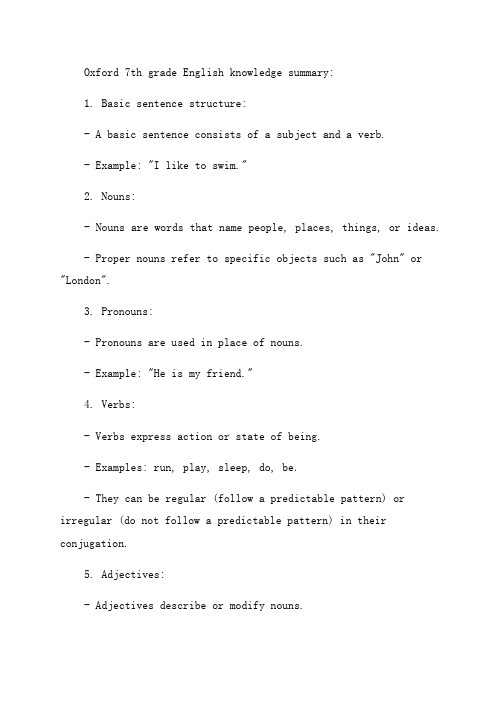
Oxford 7th grade English knowledge summary:1. Basic sentence structure:- A basic sentence consists of a subject and a verb.- Example: "I like to swim."2. Nouns:- Nouns are words that name people, places, things, or ideas.- Proper nouns refer to specific objects such as "John" or "London".3. Pronouns:- Pronouns are used in place of nouns.- Example: "He is my friend."4. Verbs:- Verbs express action or state of being.- Examples: run, play, sleep, do, be.- They can be regular (follow a predictable pattern) or irregular (do not follow a predictable pattern) in their conjugation.5. Adjectives:- Adjectives describe or modify nouns.- They can describe qualities (e.g., beautiful, tall), sizes(e.g., big, small), or colors (e.g., red, blue).6. Adverbs:- Adverbs describe or modify verbs, adjectives, or other adverbs.- They often end in -ly.- Example: "She sings beautifully."7. Prepositions:- Prepositions are words that indicate relationships between other words in a sentence.- Examples: in, on, at, under, between.8. Conjunctions:- Conjunctions join words, phrases, or clauses.- Examples: and, but, or.9. Articles:- Articles are the words a, an, and the.- "A" and "an" are indefinite articles, used to refer tonon-specific nouns.- "The" is a definite article, used to refer to specific nouns.10. Tenses:- Present tense: describes actions happening now.- Past tense: describes actions that have already happened.- Future tense: describes actions that will happen in the future.11. Word order:- In English, the basic word order is subject-verb-object (SVO).- Example: "She eats an apple."12. Question formation:- Questions in English are usually formed by inverting the subject and the auxiliary verb.- Example: "Do you like chocolate?"13. Contractions:- Contractions are shortened forms of two words, created by replacing a letter or letters with an apostrophe.- Examples: "I'm" (I am), "can't" (cannot).14. Idioms:- Idioms are phrases or expressions that have a different meaning than their literal interpretation.- Example: "It's raining cats and dogs."15. Regular and irregular plurals:- Regular plurals are formed by adding -s or -es to a noun.- Irregular plurals have unique forms.- Example: "book" (singular) vs. "books" (plural) / "tooth" (singular) vs. "teeth" (plural).- Examples: big - bigger - biggest; good - better - best.- Greetings: hello, goodbye, thank you.- Personal information: name, age, nationality.- Numbers, colors, days of the week.18. Basic dialogue and conversation:- Introducing oneself and others.- Asking for and giving directions.- Ordering at a restaurant.- Talking about likes, dislikes, and hobbies.- Understanding short texts and answering questions about them.- Identifying main ideas and supporting details.20. Writing skills:- Basic paragraph structure: topic sentence, supporting sentences, concluding sentence.- Writing simple sentences and short paragraphs about familiar topics.- Using correct punctuation and capitalization.。
- 1、下载文档前请自行甄别文档内容的完整性,平台不提供额外的编辑、内容补充、找答案等附加服务。
- 2、"仅部分预览"的文档,不可在线预览部分如存在完整性等问题,可反馈申请退款(可完整预览的文档不适用该条件!)。
- 3、如文档侵犯您的权益,请联系客服反馈,我们会尽快为您处理(人工客服工作时间:9:00-18:30)。
牛津七年级上英语知识点汇总————————————————————————————————作者:————————————————————————————————日期:2九年级英语(七年上英语知识点总结)Unit 1 This is me!短语归纳:look after \ take care of 照顾on the first day 在第一天Class 1,Grade 7 7年级1班play football 踢足球after school 放学后be\come from 来自be good at \do well in 擅长fly kites 放风筝go home 回家listen to music 听音乐play a game 玩游戏wear glasses 戴眼镜at school 在学校all the lessons 所有的课程talk about 谈论over there 那里a lot of hobbies 许多爱好用法集萃:love\like doing sth 喜欢做某事let’s +动词原形让我们I am\My name is 我叫welcome to +地点欢迎来到This is 这是be good at \do well in doing 擅长做in Class…Grade…在几年级几班live with…in…和谁住在哪里I’m …year old. 我几岁了。
I have…hair.我留着……头发典句背诵What’s your name?你叫什么名字?Nice to meet you! 很高兴见到你。
I love reading. 我喜欢阅读Now let’s meet our new classmates. 现在让我们认识下我们的新同学。
I often play football after school.放学后我经常踢足球。
She is tall and slim. 她个头很高,身材苗条。
He is from Nanjing. 他来自南京。
He is good at Maths. 他擅长于数学。
Millie is 11 years old. 米莉11岁。
They are all very nice.他们都很好。
I am good at dancing. 我擅长于跳舞。
语法:连系动词be 的一般现在时动词be 的三变化am is are. 我(I)用am ,你(you)用are ,is 用于他(he)她(she)它(it),单数名词用is,复数名词都用are句型结构:1、肯定句:主语+am\is\are …It is a football.2、否定句:主语+am\is\are+not…It is not a football.3、一般疑问句:Am\Is\Are+主语+其他?Is it a football? 回答Yes, it is. No, it isn’t4、特殊疑问句:疑问句+am/is/are +主语+其他?What’s your name?Unit 2 Let's play sports!短语归纳:3play sports 做运动many times a day 一天许多次play football/tennis 踢足球/打网球talk about 谈论after school 放学后go swimming 去游泳a member of …中的一员come from 来自listen to music 听音乐in the next World Cup 在下届世界杯come true 实现in one’s free time 在某人的空闲时间live in 住/生活在read books 看书at/ on weekends=at/on the weekend在周末stay at home 待在家里 a lot of 许多ask sb. about sth. 问某人某事on TV 在电视上Watch basketball matches 看篮球比赛feel great 感觉特棒用法集萃:What about doing sth. ?做…怎么样?enjoy doing sth. 喜欢做某事make sb./sth. +adj 使某人/某物make sb. do sth. 使某人做某事want to do sth. 想要做某事hope to do sth. 希望做某事have fun doing sth. 做某事开心典句必背I like walking. 我喜欢散步。
I enjoy swimming.What’s your favourite sport? 我喜欢游泳,他最喜欢的运动是什么?I hope his dream comes true. 我希望他梦想成真。
What does Li Hua do in his free time? 李华在业余时间做什么?What else do you want to do? 你还想做什么其他的事情?Reading is fun. 读书是有趣的事情。
语法:行为动词的一般现在时行为动词的一般现在时的构成:主语+行为动词+(其他)当主语为第三人称单数(he, she, it)时,谓语动词也要用单数形式。
用好一般现在时,时间状态需牢记;主语人称是三单,动词要把-s/-es 添;基本用法要记清,状态习惯经常性。
行为动词的一般现在时的变化(1)否定句:主语+ don’t/doesn’t + 动词原形+其他I don’t like bread. He doesn’t often play football.(2)一般疑问句:Do/Does + 主语+动词原形+其他Do you often play football? Yes, I do /No, I don’tDoes he often play football? Yes, he does/ No, he doesn’t3、特殊疑问句:特殊疑问句+一般疑问句?When do you go to school? I go to school at seven o’clock.动词的三单形式的变化:动词三单现在时,一般在词尾加S ; S,x,ch,sh,在词尾,直接加上-es词尾若是字母o ,加上-es 不用愁。
词尾是“辅音字母+y” ,先变y为i, 后边再加-es4Unit 3 Welcome to our school!短语归纳:on foot 步行far away from 远离a few 一些,少量learn about 学得,获知would like sth/to do sth 想要/想要做某事after class 下课后on this day 在今天all kinds of 各种各样on the phone 在电话中look at 看ground floor 底层,一楼on the wall 在墙上by bus 乘公共汽车in front of 在……前面let me see 让我看看go to school 去上学reading room 阅览室borrow … from …从……借……get to school 到达学校on the Open Day 在开放日用法集萃:Thank you for doing sth 为做某事而感谢你be ready to do sth 准备做某事It takes sb some time to do sth 花费某人多少时间做某事show sb around 领某人参观need to do sth 需要做某事典句必背:Welcome to our school.欢迎来到我们学校。
What’s the date taday?今天几月几号Let’s meet at the school gate at 1:30.让我们1:30 在学校门口会面吧Who’s that man in the white shirt?穿白衬衫的那个男的是谁?There are all kinds of books in our library.在我们图书馆有各种各样的书I’d like to say hello to her.我想向她问好。
Do you borrow books from the library?你从图书馆借书吗?We only have a few classrooms.我们只有几间教室It takes me about an hour to get to school.大约花了我一个小时的时间到达学校。
语法:一、人称代词人称代词主格:作主语,表示谁怎么样了、干什么了。
I am a teacher. You are student. He is a student, too.We/You/They are students.人称代词宾格作宾语,表示动作行为的对象。
Give it to me. Let’s go (let’s =let us)单数复数人称主格宾格主格宾格第一人称I me we us第二人称you you you you5第三人称he himthey them she herit it二、物主代词表示所有关系的代词叫做物主代词,也可叫做代词所有格。
物主代词分形容词性物主代词和名词性物主代词二种,其人称和数的变化见下表。
数人称类别单数复数第一人称第二人称第三人称第一人称第二人称第三人称形容词性物主代词my your his her its our your their名词性物主代词mine yours his hers its ours yours theirs汉语我的你的他的她的它的我们的你们的他(她、它)们的形容词性物主代词(my/your/his/her/its/our/their)+名词而名词性物主代词则相单于形容词性物主代词+名词,故其后不必加名词。
如:Is this your book? No,,it isn’t,it’s hers(her book)This pen is mine.人称代词的顺序:单数的人称代词为第二人称,第三人称,第一人称(2,3,1)复数的人称代词为第一人称,第二人称,第三人称(1,2,3)Unit 4 My day短语归纳:Wake sb up 叫醒某人go out 出去,熄灭have breakfast/lunch/dinner 吃早中晚饭have fun 玩的开心get up 起床have lessons 上课go to bed 去睡觉be late for 迟到chat with 聊天each other 相互have a good time 玩的开心all the best 一切顺利,万事如意get ready for为……准备好need a good rest 需要好好休息do morning exercises用法集萃It is time for sth/ to do sth 到该做什么的时间到了。
